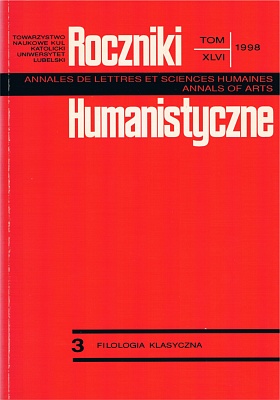Apostrophe and Exclamation in Sedulius' Paschale carmen
Abstract
The author enumerates and concisely characterizes the works of Sedulius, the Latin Christian poet of the mid-fifth century. On the basis of the most proximate context and composition of the whole poem he reviews all the apostrophes and exclamations contained in the five books of the Paschale carmen. He defines apostrophe as the poet's direct turn to persons, deities, a personified idea or object, rated among the rhetorical figures in lofty style. Apostrophe often takes on the form of exclamation, which is an exclamatory proposition, sometimes cut short or elliptic, a parenthesis or an expression of emotional commitment. In the paper we find some quotations of Latin apostrophes and exclamations translated by the author, the first time in Polish, along with a short explanation of the contents of particular quotations.
In conclusion all the persons are shown, God and Christ, ideas and objects taken into account in apostrophes and exclamations, with the place where they occur.
The author states that apostrophe and exclamation used by Sedulius are an important means of pathetic and epigrammatic poetry, a structural element of the work, serving to present the scenes in an affective manner, and to stress the essential main motives of the theme about Christ as the Agent of salvation. They adorned the language and could serve as an aid to convert the lovers of poetry among the highly educated pagans.
Copyright (c) 1998 Roczniki Humanistyczne

This work is licensed under a Creative Commons Attribution-NonCommercial-NoDerivatives 4.0 International License.





